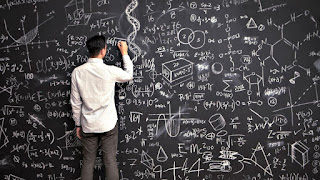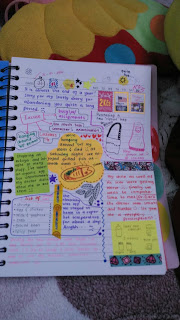Now days, I
personally agree that technology is no longer can be separated from daily life
of human being. Just like machine, technology has been used as a media to help
people with their works. In every aspect of live, it is such a common that the
use of technology cannot be neglected. Due to its importance, technology
certainly gives a big contribution to children’s’ development; their physic,
cognitive, emotion, social, and psycho-motor. Technology for me can either give
positive effect on children’s education or the opposite. Literacy skill is one
of the examples of aspect that requires technology recently. I realize that
since early age, lots of children have been exposed with technology to support
their literacy practice. According to that fact, a question arises, is there
any impact of technology on literacy practice?
Before I move
further, I will give a brief definition about term ‘literacy’ first. Literacy
that I mention here is a certain skill of how to write and read properly. Based
on UNESCO, Literacy means the ability to identify, understand, determine,
create, communicate, and calculate using written form that is involved with
every different context. This ability is actually considered crucial to
everyone. Because of its importance, I
believe that literacy should be introduced to everyone since early age. And I
found that technology can be beneficial to support literacy practice. Moreover,
since globalization era, technology has been grown rapidly and immerse within
literacy unconsciously.
Literacy practice that includes technology can take various
forms in educational settings. It can support old/traditional literacy, it can also introduce new forms in the classroom.
Technology can help students discuss their ideas by bringing readers and
writers together in the same classroom, and it can help students work together
at different times through social media, certain websites for studying and blogging. Another nice feature of using technology is that it allows
students to creatively combining various media. The resulting product can be a
combination of traditional writing and other new technology-based form. So it can be said that technology is a bridge to invent a new form of education beyond the limit.
The recent study
mentions about the development of technology to maximize children’s literacy
skill, especially since the early age. There is a journal written by Mary-Jane
Shuker and Lisa Terreni from University of Wellington, New Zealand, that stated
the usage of technology can be further extended to help children’s reading
ability since early age. They told that the one of technology media in computer
like Power Point Presentation can be used by children in New Zealand to make a
Self-Authored E Book—the book that they created themselves. The purpose is to
help them learning how to read properly. They believe that the use of
technology cultivates children’s interest and creativity that is crucial to
teaching and learning process.
Shuker and Terreni
also explained how a teacher of young learner in New Zealand introduce the
E-book made by him/her using all feature of powerpoint—text, picture,
animation, sound—to children in his/her class. He/she picks a very simple theme
that is fit with children’s level of age and knowledge. After demonstrating how
to make and use this kind of technology, his/her students is so excited and
even more interested to make it by their own.
Another form of
technology which is very common used in this era is computer/laptop, and cell
phone. I realize that now, most children already have their own cell phone. If
it is used properly, cell phone can be useful for education and literacy skill.
There are so many good applications that can grow children’s motivation to
read, with interesting visuals and sounds, reading can be no longer a boring
activity. Because children can both read and stimulate their vision by numerous
catchy pictures that compliment the article.
Same with cell phone, computer can be a good
device for children to learn too. With computer, children now days can practice
their writing ability with simulate them to type any letter on it. It sounds
really simple actually, but in fact there are many children now that learn how
to write using computer. In Early
Childhood Education book, which is written by Eva L. Essa (2010,209), there
is a question that may be asked by many teachers and parents, “When should
young children be exposed to computers?” this question is answered by S.W Haughland
in this book that children are better not be exposed to computer from age 1-3,
but beyond that age, that is their critical age to absorb any new information
faster, so it is very good to introduce them to technology so they can use it
to enhance their literacy skill. Another study regarding the usage of computer
also conducted Lapp and Flood
(1997), they identified that computers and other forms of multi media facilitate the
use of electronic texts, such as email, podcasting and wikis, and thus require
new conceptions of literacy and literate behaviours (Leu & Kinzer, 2000;
Labbo, 2006).
The development of
technology also produces a new term of literacy in this era. Multiply different terminology has been occurred in recent years to indicate how literacy has been changing. The new modes of communication, e.g. visual
literacy, new literacies, digital literacies, multimodality and multiliteracies indicate that now
literacy skill in children can be taught easier using technology. Literacy
material can be taught in form of games, videos, songs and any other forms that
will increase children motivation to learn basic literacy skill. By using
technology, children may don’t feel any pressure to read because they find it
is interesting and so simultaneously they will train their literacy practice
while playing. At the end, teaching and learning activity can be more
enjoyable.
So the invention of
technology brings a huge impact toward the development of children’s literacy
skill. In practice, children now are exposed to technology in order to increase
their literacy ability, with so many features that technology have, it make
children easy to access any education-based material that can help their
reading and writing comprehension. For me, this is really good news in
education domain, technology really helps me with so many things related to
education. One thing that should be remembered, make sure that children use the
technology under parental control, because aside of all the benefits, I think
that technology also can give a bad impact towards children literacy
development if it is not used properly.
References :
Essa, E. L. (2010). Introduction to Early Childhood
Education. California: Wadsworth, Cengage Learning.
Mary-Jane Shuker & Lisa Terreni. (2013). Self-authored
e-books; Expanding Young Children Literacy Experiences and
Skills. Australasian Journal of Early Childhood , 1-8.







































